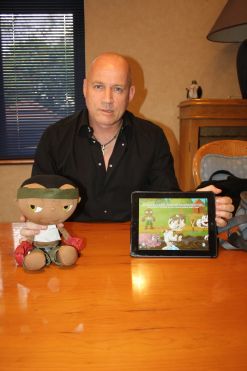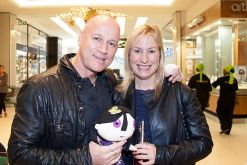
Adopt a Trashcankid
His ragged pants and vest and grimy headband make Samson the kind of kid you cross the road to avoid. Too-big boxing gloves and the inflexibility of his stare do not help dispel the notion that Samson is a bully bruising for a fight. First impressions would be wrong though. Nine-year-old Samson lives on the […]


(Image: Sulaiman Philip)
His ragged pants and vest and grimy headband make Samson the kind of kid you cross the road to avoid. Too-big boxing gloves and the inflexibility of his stare do not help dispel the notion that Samson is a bully bruising for a fight.
First impressions would be wrong though. Nine-year-old Samson lives on the street and every day is a struggle to find food, shelter and clothing. The tough exterior hides a soft caring side; older than his years he has become a protector to the other kids he shares the streets with.
At least that is the back story that has been created for Samson, a doll, and part of the Trashcankidz range of dolls now available for adoption online or at the company’s adoption centre in Sandton City.
Samson represents the one million children living and fending for themselves on the streets of South Africa and is one of five different dolls on sale. There is the Jamaican, Calypso, Chinese Solo, American Rose and the Russian, Slam. Each doll – eventually there will be 20 different dolls available – represents the more than 100 000 000 street children across the globe.
Trashcankidz is the brainchild of Sean Roelofsz, a former investment banker, who heeded Warren Buffet and Bill Gates’s call five years ago to use their wealth for philanthropic causes. “With all the money floating around the world why does a child die of hunger every five seconds? Why do 115 children prostitute themselves every hour?” asks Roelofsz.
“I was at a crossroads, wondering how to balance my material success with my desire to do good. It all came together when I read a Unicef report on street children. I’m a father and the love I have for my children knows no bounds, but there are kids who will never know that feeling. Trashcankidz was born in that moment from my desire to give back.”
Capitalism against poverty
Roelofsz is one of a growing breed of philanthrocapitalists, successful business people who are using their wealth and business skills to make a positive difference to the world. They choose to be active donors, whose charitable giving is focused, strategic and collaborative. “If I donate to a charity they can’t tell me exactly how my money is being spent; I want to know that I am making a difference to a cause that matters to me.”

(Image: Trashcankidz)
Trashcankidz donates 20% of all income to community-based charities working with kids. Presently the focus is on South Africa-based groups but Roelofsz plans to roll out the campaign internationally by the end of next year. “We’re not a charity. We’re a commercial venture with a social conscience.”
Dolls have been on sale for a month now and the only store in the country is the company’s adoption centre at Sandton City mall. Parents outside of Gauteng can buy dolls online, but the experience of choosing a doll, signing the adoption register and pledging to care for your new little brother or sister adds to the sense of responsibility a child develops. This is a big part of the appeal for children; raised awareness that their play can improve the life of a less fortunate child. Roelofsz says he wants to convert children into “playmanatarians”.
Inspired by the 1980s Cabbage Patch Kids dolls, Roelofsz felt there had to be a way to harness the hysteria those toys created to change the world. He felt that the ceremony involved in the adoption was important to create a personal involvement with the toy that was not present with other dolls.
Each doll comes with an adoption certificate and a trashcan-shaped backpack. The company’s research has shown that the ceremony involved forms a bond between a child and the doll. The new toy becomes a little brother or sister that travels with the family. “This bond is important to what we want to do. Children feel empowered by the idea that they are responsible for caring for another individual.”
Beyond the dolls, parents can download an app, available for free on iTunes, with animated back stories for each doll, and music and games for their children. As the brand grows the company will expand the content available. The idea of giving back is also driven by monthly tasks for children. “The tasks are designed to remind children that they can and do make a difference in their world.”
It has taken five years of design and development to produce a toy that is certified safe for a global market. A Trashcankidz “adoption” does not come cheap; a doll costs R499 but Roelofsz explains that less than half of the price is profit. “Each doll costs R125 at the factory gate, add on another R65 to get a doll into a store, then at least 20% is donated before we see any income. We also have limited quantities, which does add to the collectability of each doll, but that means higher costs.”
A global brand for caring
Rock musicians The Parlotones are South African brand ambassadors for Trashcankidz and Roelofsz is in negotiations with cricketer Graeme Smith to be the face of the company in India. In the research and development phase for the dolls Roelofsz had meetings with American marketers and representatives from the Disney Corporation. Interest was strong with even a mention of Justin Bieber being a global brand ambassador.
But Roelofsz says, “We weren’t ready for that kind of exposure. What would have happened? Bieber would have told his millions of supporters that he had found this amazing doll and I would suddenly have 10 million orders that I could not fill. That success would have been our failure.”
Becoming a global brand is the business strategy but spreading the message behind the dolls in South Africa comes first. In this quest the company has had its fair share of good fortune. Roelofsz tells the story of an American couple who were in South Africa to adopt a young orphan.
The family were strolling around Sandton City and came across the Trashcankidz store. “They were drawn to Samson and the similarities between his story and that of the young boy that they had adopted. The father is a minister in a church, well connected, and he was going to spread the word among congregations back home.
“He believes in what we are trying to do, and wants to help. He believes that anything done to improve the plight of a child is a worthy cause. That’s what drives us.”
By: Sulaiman Philip
Source: www.mediaclubsouthafrica.com
